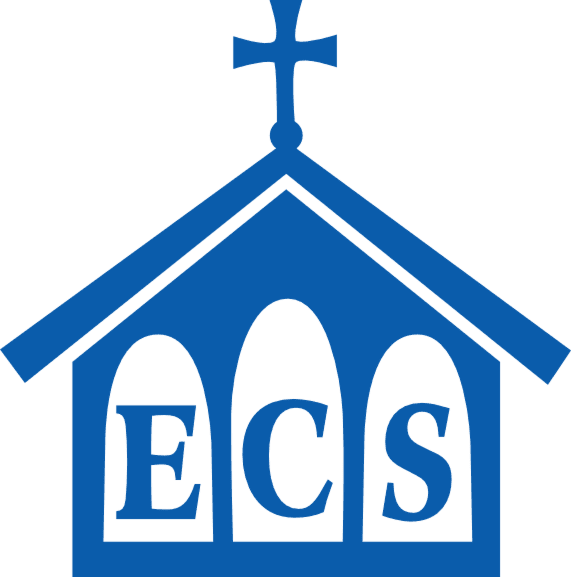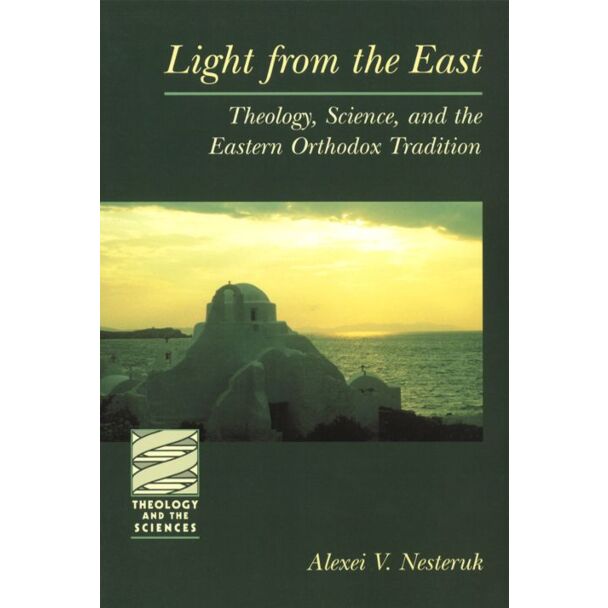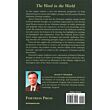Light from the East: Theology, Science, and the Eastern Orthodox Tradition
Alexei V. Nesteruk
Publication Data: Minneapolis, MN: Fortress Press, 2003
Format: softcover
Number of Pages: viii + 287
Dimensions (l × w × h): 22.9 cm × 15.4 cm × 1.9 cm
ISBN: 0‒8006‒3499‒3
Alexei V. Nesteruk
A volume of Theology and the Sciences
“The fundamental question in both theology and science is the question of truth. The achievement of the Greek Patristic synthesis was to link the problem of truth with the idea of liturgical experience in order to proclaim that truth, as ontological truth, is accessible only through and within communion with God in ecclesial community. This can have implications for the science-religion dialogue. Indeed, the traditional split in religion and science into truth in theology and truth in science is rooted in most cases in the disconnection of each ones truth from the idea that both science and theology have the common ground of truth, the common source of their ontological otherness: God, whose being—as well as ours in God—is revealed through communion.”
—“Preface”
CONTENTS
Preface
1. Introduction
Orthodoxy and Science: Special Experience
2. Patristic Theology and Natural Sciences: Elements of History
Introduction—The Problem in Its Historical Setting—The Apologists and Greek Religious Philosophy—Science and Philosophy as Cooperating in Truth—Faith as a Condition for Knowledge—The Interpretation of Nature—The Laws of Nature—The Transfiguration of Nature—From Uniformity in Nature to the Logos of God: St. Athanasius—St. Maximus the Confessor on the logoi of Creation—Detachment from Nature and the Love of Nature—The Latin Church and the Natural Sciences—St. Augustine of Hippo and the Natural Sciences—Science as the Handmaiden of Theology in St. Augustine—Seminal Reasons and Natural Law in St. Augustine—The Differences between the Greek and Latin Treatment of Nature and Science
3. What Makes Theology Unique among Sciences: The Patristic Vision versus Modern Understanding
Theology as Experience of God: Patristic Vision—The Inevitability of Mysticism in Theology—Thelogy as Unique—Churchs Definitions as Boundaries of Faith—Apophaticism of Orthodox Theology—The Faculty That Makes Theologia Possible and Its Role in Discursive Theologizing—What in Theology Can Be Related to Science?—Christ-Event as the Foundation of Theology—Science and Theology Compared—Spiritual Intellect and Mediation between Theology and Science—Orthodox Theology and Philosophy—Orthodox Theology and Science: Epistemological Formula
4. Toward a Theological Methodology of Mediation with Science
Philosophy and Apophaticism—Scientific Monism and Apophaticism—Antithetic Dialectics and Antinomial Monodualism—Theological Apophaticism and Transcendental Philosophy—The logoi of Creation and the World—The logoi of Creation and Antinomies—Hypostatic Dimension in Theistic Inferences from Creation—The Universe as Hypostatic Inherence in the Logos of God
5. Creation in Cosmology and Theology
Creatio ex nihilo and Contingency of the World—Creation and Incarnation: Intelligibility of the World and Scientific Advance—Creation in Classical Cosmology: Cosmological Evolution and Initial Conditions—Elimination of Real Time in Quantum Cosmology—Some General Comments on Hawkings Model—Imaginary Time in Quantum Cosmology and Timeless Time in Christian Platonism—Quantum Cosmology: Diaphora in Creation versus Creation out of Nothing
6. Irreversibility of Time and the logos of Creation
Irreversibility of Time and Eternity—Irreversibility of Time and Boundary Conditions in the Universe—Penroses Model and Its Theological Interpretation—Irreversibility of Time through Irreversibility of Processes—Irreversibility and Two Views of Nature—Prigogines Treatment of the Time Paradox—From Irreversibility in Physics to Theological Contingency
7. Humanity as Hypostasis of the Universe
Defining the Humankind-Event—The Humankind-Event and the Anthropic Principle—Hypostatic Dimension of the Humankind-Event—From Anthropic Transcendentalism to Christian Platonism—Intelligibility and Meaning of the Universe: The Participatory Anthropic Principle—The Humankind-Event and the Incarnation—The Universe as Hypostatic Event
Abbreviations
Notes
Bibliography
Index
Format: softcover
Number of Pages: viii + 287
Dimensions (l × w × h): 22.9 cm × 15.4 cm × 1.9 cm
ISBN: 0‒8006‒3499‒3
Alexei V. Nesteruk
A volume of Theology and the Sciences
“The fundamental question in both theology and science is the question of truth. The achievement of the Greek Patristic synthesis was to link the problem of truth with the idea of liturgical experience in order to proclaim that truth, as ontological truth, is accessible only through and within communion with God in ecclesial community. This can have implications for the science-religion dialogue. Indeed, the traditional split in religion and science into truth in theology and truth in science is rooted in most cases in the disconnection of each ones truth from the idea that both science and theology have the common ground of truth, the common source of their ontological otherness: God, whose being—as well as ours in God—is revealed through communion.”
—“Preface”
CONTENTS
Preface
1. Introduction
Orthodoxy and Science: Special Experience
2. Patristic Theology and Natural Sciences: Elements of History
Introduction—The Problem in Its Historical Setting—The Apologists and Greek Religious Philosophy—Science and Philosophy as Cooperating in Truth—Faith as a Condition for Knowledge—The Interpretation of Nature—The Laws of Nature—The Transfiguration of Nature—From Uniformity in Nature to the Logos of God: St. Athanasius—St. Maximus the Confessor on the logoi of Creation—Detachment from Nature and the Love of Nature—The Latin Church and the Natural Sciences—St. Augustine of Hippo and the Natural Sciences—Science as the Handmaiden of Theology in St. Augustine—Seminal Reasons and Natural Law in St. Augustine—The Differences between the Greek and Latin Treatment of Nature and Science
3. What Makes Theology Unique among Sciences: The Patristic Vision versus Modern Understanding
Theology as Experience of God: Patristic Vision—The Inevitability of Mysticism in Theology—Thelogy as Unique—Churchs Definitions as Boundaries of Faith—Apophaticism of Orthodox Theology—The Faculty That Makes Theologia Possible and Its Role in Discursive Theologizing—What in Theology Can Be Related to Science?—Christ-Event as the Foundation of Theology—Science and Theology Compared—Spiritual Intellect and Mediation between Theology and Science—Orthodox Theology and Philosophy—Orthodox Theology and Science: Epistemological Formula
4. Toward a Theological Methodology of Mediation with Science
Philosophy and Apophaticism—Scientific Monism and Apophaticism—Antithetic Dialectics and Antinomial Monodualism—Theological Apophaticism and Transcendental Philosophy—The logoi of Creation and the World—The logoi of Creation and Antinomies—Hypostatic Dimension in Theistic Inferences from Creation—The Universe as Hypostatic Inherence in the Logos of God
5. Creation in Cosmology and Theology
Creatio ex nihilo and Contingency of the World—Creation and Incarnation: Intelligibility of the World and Scientific Advance—Creation in Classical Cosmology: Cosmological Evolution and Initial Conditions—Elimination of Real Time in Quantum Cosmology—Some General Comments on Hawkings Model—Imaginary Time in Quantum Cosmology and Timeless Time in Christian Platonism—Quantum Cosmology: Diaphora in Creation versus Creation out of Nothing
6. Irreversibility of Time and the logos of Creation
Irreversibility of Time and Eternity—Irreversibility of Time and Boundary Conditions in the Universe—Penroses Model and Its Theological Interpretation—Irreversibility of Time through Irreversibility of Processes—Irreversibility and Two Views of Nature—Prigogines Treatment of the Time Paradox—From Irreversibility in Physics to Theological Contingency
7. Humanity as Hypostasis of the Universe
Defining the Humankind-Event—The Humankind-Event and the Anthropic Principle—Hypostatic Dimension of the Humankind-Event—From Anthropic Transcendentalism to Christian Platonism—Intelligibility and Meaning of the Universe: The Participatory Anthropic Principle—The Humankind-Event and the Incarnation—The Universe as Hypostatic Event
Abbreviations
Notes
Bibliography
Index
Write Your Own Review






